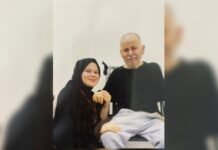The journal of deceased journalist Mevlüt Öztaş, who succumbed to cancer after his belated release from prison, details his ordeal in prison as a cancer patient.
Öztaş passed away in August from pancreatic cancer, after a belated release from prison despite medical reports recommending he be freed. His journal detailed the longing he felt for his home and family and the anxiety caused by his illness. It also mentioned the resentment he felt about the false accusations that landed him in prison and the injustice surrounding his trial. The journal was received by his family and published by Kronos news.
Öztaş was arrested in February 2018 as part of a post-coup crackdown on the Gülen movement, a religious group inspired by Turkish cleric Fethullah Gülen. Turkey’s president, Recep Tayyip Erdoğan, has been targeting followers of the movement since the corruption investigations of December 17-25, 2013, which implicated then-Prime Minister Erdoğan, his family members and his inner circle.
Dismissing the investigations as a Gülenist coup and conspiracy against his government, Erdoğan designated the movement as a terrorist organization and began to target its members. Erdoğan intensified the crackdown on the movement following a coup attempt on July 15, 2016 that he accused Gülen of masterminding. Gülen and the movement strongly deny involvement in the abortive putsch or any terrorist activity. Following the allegations, he called on the Turkish government to allow for an international investigation.
Öztaş was sentenced to nine years, three months in prison in February 2019 for his eight years of work at the Gülen-affiliated Cihan news agency, which was seized by the government and closed down by a decree-law after the coup attempt. His sentence was upheld by an appeals court.
Öztaş mentioned that the prison administration was far from careful when addressing his fragile health. In a diary entry dated April 4, 2020, he said: “I was very weak and went to the infirmary in a wheelchair. The doctor called an ambulance, but the prison administration wouldn’t allow it and sent me to the hospital in a prison transfer van.”
He noted that the ill-handling did not cease once in the hospital. “I was so weak I could barely stand, but they insisted on handcuffing me in the hospital. I had to be taken to a bigger hospital, and during the transfer, they handcuffed me in the ambulance. I was accompanied by gendarmes everywhere, and after a point, I fainted.”
Öztaş had multiple health problems including kidney and liver failure and hypertension; however, his repeated requests to be released on parole on health grounds were rejected.
A regional court also refused to release him despite a medical report from an Ankara hospital deeming him unfit to remain in prison. When he was at last released on June 23 upon appeal, the cancer had spread to his intestines, liver and lymph nodes.
Öztaş mentioned that he felt emotional and anxious over the side effects of chemotherapy. “My hair is starting to fall out. I am slowly acknowledging that I have cancer now. All the medicine and injections, but it was a fistful of hair that forced me to accept this illness,” he said in an entry dated May 10, 2020.
Öztaş noted that he was in immense emotional and physical pain. He referred to special days like his wedding anniversary and Eid, a Muslim festival, and talked about how those days brought more grief because he was away from home.
According to the American Cancer Society, mental health care and emotional support can help patients and their loved ones better manage cancer and its treatment, as cancer is very challenging emotionally for everyone involved.
Öztaş’s morale was apparently not high. His diary entries mostly spoke of his grief about being punished for a crime he did not commit and being deprived of the simplest joys of life. “I am daydreaming about a nice warm breakfast. But now I am in a solitary cell because of the coronavirus pandemic,” he said on May 31, 2020.
His final entry said, “Life is a trajectory that cannot be repeated, and regret does not change anything.”
Öztaş leaves behind a grieving wife and four children.
As part of the post-coup purge, the Turkish government dismissed more than 150,000 public servants from state jobs and investigated almost 600,000 people, detaining or arresting half of them including hundreds of journalists on trumped-up terrorism-related charges.















